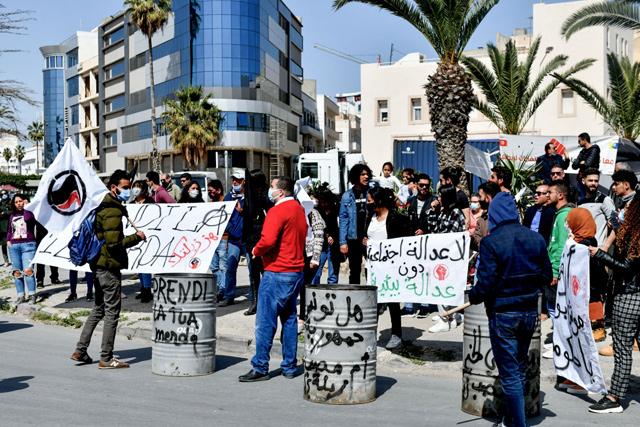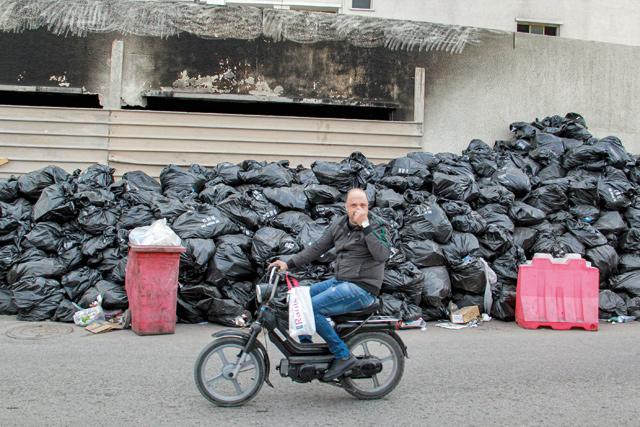You are here
Tunisia cracks down with arrests in Italy hazardous waste scandal
By AFP - Dec 23,2020 - Last updated at Dec 23,2020
SOUSSE, Tunisia — Tunisia arrested a dozen people including its environment minister on Monday in a scandal over hundreds of containers of household waste shipped from Italy to the North African country.
The 282 containers were seized this summer by Tunisian customs officials in the Mediterranean port city of Sousse.
They were declared to be carrying plastic scraps for industrial recycling — but were instead filled with mixed, putrid household waste, which is barred from import under Tunisian law.
The case shines a spotlight on the murky global trade in waste, which has grown despite stricter regulations aimed at preventing rich countries from dumping their hazardous refuse on poorer countries.
The containers were imported in two shipments by Tunisian firm Soreplast, which claimed to have government permission to import and recycle industrial plastic scraps.
A copy of Soreplast's import request seen by AFP stated that the company would "temporarily" import the waste "in non-hazardous bales... for sorting, recycling and re-export operations to European territory".
However, the contract Soreplast signed with the Italian firm that sold the refuse, Sviluppo Risorse Ambientali Srl, tasked Soreplast with "recovery of the waste and its subsequent disposal" in Tunisia.
Neither company was available for comment despite numerous efforts to contact them by AFP.
Amid the scandal, Prime Minister Hichem Mechichi sacked the environment minister, Mustapha Aroui, late Sunday.
Twelve people have since been taken into custody, including Aroui and a top ministry official, said Sousse court spokesman Jabeur Ghnimi.
Also detained were officials of the National Waste Recycling Agency (Anged), customs service and national environmental protection agency, the owner of a private laboratory and a Tunisian diplomat in Naples.
The owner of Soreplast remains at large, Ghnimi said.
A total of 23 people have been questioned, accused of charges including “use of false documents” and “participation in the prohibited import of hazardous waste”, he said.
Booming trash trade
The global waste trade has been growing as more industrialised and urbanised countries dump their garbage in developing countries.
Interpol warned in August that criminal organisations have profited from an “overwhelming” surge in illegal waste shipments, particularly to Asia but also other parts of the world.
The garbage often ends up in countries that are ill-equipped to cope with it and endure heavy pollution when waste is burned and dumped in Soreplast’s contract with the Italian firm, which collects and processes waste in the southern region of Campania, stipulated that it would dispose of up to 120,000 tonnes of waste at 48 euros ($59) per tonne — a total of more than 5 million euros.
On July 8, Tunisian officials decided to confiscate the containers and send them back to Italy, said a customs official, speaking on condition of anonymity.
But they remain in Tunisia.
AFP journalists visited the busy port in early December and saw the remaining 212 containers stacked in a storage area.
Judicial experts were examining their contents, the port’s director said, but refused to grant AFP access to the garbage despite authorisation from the relevant ministries.
‘Huge quantity’
The case has set off alarm bells in Tunisia, which lies only a few hundred kilometres from Europe and struggles to deal with its own waste.
Just 61 per cent of waste in the capital Tunis is collected, according to a recent World Bank report, and most of that ends up in open-air landfills.
“This case shows that big lobbies” are at play in Tunisia, said Hamdi Chebaane, a waste management expert and member of environmental coalition Tunisie Verte, speaking before the arrests.
He charged that the environment ministry has come under heavy pressure in recent years from businessmen wanting to import waste.
Bechir Yahya, the head of recycling agency Anged, earlier accused the customs agency of allowing the waste to enter Tunisia “with no official authorisation”.
But the customs service countered that Anged, which operates under the environment ministry, gave the green light to remove from the port the first 70 containers.
AFP has seen an email exchange between Yahya and customs officials, in which he states that he saw “no objection to the importation of these plastic products... that do not contain dangerous products” after seeing the results of samples taken from the waste.
Yahya later said the e-mail expressed only his “personal opinion” and was “not an official document”.
Environmentalists worry about what would have happened if the case had not come to light.
“This huge quantity, which Tunisia would have been unable to bury, where would it have been sent?” said Chebaane.
Related Articles
SOUSSE, Tunisia — Dozens of Tunisian activists protested in the port city of Sousse on Sunday to demand the return of nearly 300 containers
TUNIS — Tunisia will return more than 280 containers of waste illegally imported from Italy in 2020, the north African country’s environment
SFAX, Tunisia — Residents and activists in Tunisia’s industrial hub of Sfax are warning of an “environmental catastrophe” as mountains of un













